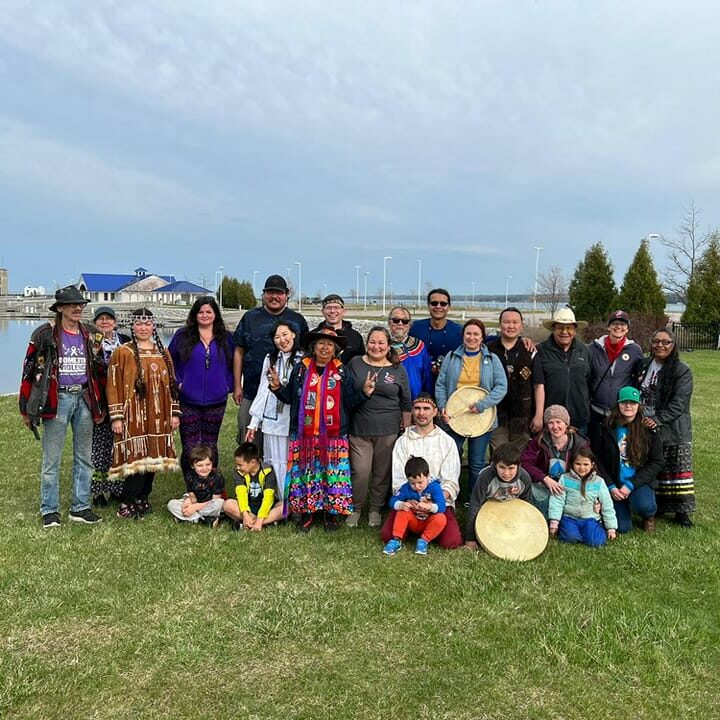By Amy Myszko
White Earth tribal members, along with participants from across the United States and Russia, have gathered twice this Spring for cultural and information sharing around protection of water, particularly in the context of Tribal societies, for which water is a central facet of life and culture. The Niibi Center, a local Native-run non-profit, co-sponsored the first event, a conference called Pipelines and Indigenous Communities, which was hosted by the American Indian Studies department at the University of Minnesota Duluth. Jill Doerfler , a White Earth band member, heads the AIS department and was of great help in organizing the event. Funding for Niibi Center staff participation came in part from the Catholic Rural Life Foundation, which holds a scholarship foundation for Joseph LaGarde, Executive Director of the Niibi Center, as well as a Medica grant which is aimed at healing generational trauma.
In mid-March, the conference fully entitled Pipelines and Indigenous Communities:
Extractive Infrastructures and Water-Dependent Livelihoods, brought together Anishinaabe, Haudenosaunne and other tribal members from around the Great Lakes region with members of at least five distinct tribes from Russia to discuss Indigenous resistance and resilience. These delegates included members of the Itelman tribe from the Kamchatka peninsula, the Sakha tribe from far east Siberia, the Udege tribe from north eastern Siberia, the Kumandin tribe from the Komi republic, and the Buryat tribe from south central Siberia. There were also allies present to hold space, learn and share knowledge specific to both Russia and the Great Lakes region and pipeline infrastructure as it relates to Indigenous peoples and lands.
This conference was primarily sponsored by the Artic Center, located at the University of Northern Iowa, and featured researchers from Russia and the United States sharing information about the impacts of pipelines on Native peoples across the globe. Primary grant funding was provided by the National Science Foundation. Researchers included Chelsea Fairbank, a college professor and PhD candidate at the University of Maine who teaches about colonization and rights of nature, as well as Andre Petrov, the head of the Arctic Cente , and his team. The gathering specifically centered around the impacts of pipelines on cultural lifeways dependent on water, whether it is the manoomin (wild rice) for Anishinaabe tribes or salmon for the Itelman people. There was a strong component of cultural sharing which included song, dance, art and language-focused presentations, as well as academic talks, in the hopes that Tribes from the Great Lakes and Russia can learn from and support one another to preserve and protect their unique, yet interconnected, ways of life. Many of the participants found hope and inspiration in learning about the struggles and triumphs of other Indigenous groups from across the globe.
The second annual Line 5 Eviction Celebration was hosted in Mackinaw City, Michigan in mid-May by the group Mackinaw Ode, or Heart of the Turtle. The event included many of the same international and Great Lakes region Tribal participants including event organizer and Anishinaabe tribal leader Nathan Wright. This yearly event focuses on celebrating the ongoing refusal of MI governor Whitmer to green-light the Line 5 Pipeline expansion and tunnel in the Mackinac Straights. The 2-day event uplifted participants through hands-on learning, for example a plant walk was hosted by Wright on the second morning, as well as storytelling, song, and dance. The first day included more academic-focused talks, but was grounded in ceremony and prayer.
Both conferences were organized and hosted by Indigenous leaders as a way for tribal people facing similar challenges to empower and uplift one another through cultural sharing in a context focused on healing and collaboration. These gatherings were just the starting point for ongoing collaboration and dialogue between Great Lakes Tribes and Indigenous Peoples of Russia. The Niibi Center intends to co-host a conference in spring of 2023 on White Earth in conjunction with the Arctic Center and others in order to continue the discussion.
Share:
